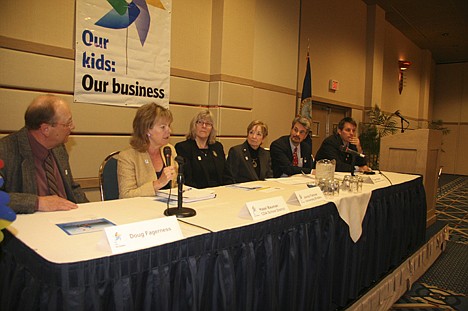Educating on economics
COEUR d'ALENE - It is never too soon to prepare children to deal with the economic realities they will face in adulthood.
How to do that in a tight economy was among the topics at a "Our kids: Our Business" forum Wednesday at The Coeur d'Alene Resort Convention Center.
"The politics of children are the politics of the future," said Jason Sabo, senior vice president of public policy for United Ways of Texas, guest speaker at the breakfast attended by about 120 members of the education, nonprofit and business community.
Sabo spent two days in Kootenai County discussing the need to provide the children the best possible education at the earliest stages of their lives.
"There are deep concerns about how education is funded," he said. "How we allocate our precious public dollars ... reflects the priorities of society."
In a moment such as the present, "We have to find everything we can do in our government that doesn't cost money," he added.
But there is "a disconnect between education and the business community. The economy and kids are not two different buckets."
Historical child advocacy has been about emotion, Sabo said, but that is not enough to meet the educational needs of graduating high school students.
"Where are those people going to be in five years?" he said, referring to the student choir that preceded his talk. "They should have the opportunity to live in a place like this if they choose. The vitality of the community depends on the choices we make. Without a skilled work force we will not have people earning the salaries necessary to be active consumers. It is a lot cheaper to hire someone from down the street than somebody from across the planet."
Dollars invested in early childhood education mean more productive wage earners in the future, Sabo said. And any third-grade teacher can tell which students will become dropouts later on.
"They get so far behind, and it is not impossible, but difficult for those children to catch up," he said.
Plenty of well-paying jobs will be critical as Baby Boomers retire and put increased demand on Medicare and Social Security. And the bad news for them, Sabo said is, "You're probably making as much money as you're ever going to make."
In a decade, "They will be consumers of public services like anybody ain't never consumed before."
Good jobs will mean consumers who buy things and pay taxes, critical to meet that demand, Sabo said.
"That could become a very distressing moment," he said.
Opportunity to improve the future will depend on politicians working together.
"We need to be post partisan," he said.
And just because things look bad now, "interesting things can happen. How? Move an agenda for kids. Understand political reality. If there is no money, it doesn't mean hide your head in the sand like an ostrich."
The community needs to think creatively before the Idaho Legislature reconvenes in January, and provide lawmakers with ideas they can work on, Sabo said.
"Politics is dirty, nasty, smelly business," he said. "That's why I love it. You've gotta do the schmooze now."
The public should also insist that programs being funded are worthwhile.
"Prioritize the youngest," he said. "If we invest in them from the outset, we will get decades of returns. If a program doesn't work, it should not be getting any public money."
Educating kids will make them better citizens, and help keep them out of jail later in life.
"It costs more to send someone to prison than to send them to Harvard," Sabo said.
Doug Fagerness, former director of Head Start in Kootenai County, agreed that early childhood development will better prepare kids for their school years.
"Be sure the schools are ready for the children," he said. "The demands on schools are incredible."
They are also an important part of the community, said Hazel Bauman, superintendent of the Coeur d'Alene School District. Of the 10,000 students in the district 43 percent are living in poverty, and 7,000 qualify for free or reduced price breakfast or lunches served in the schools.
"We know a hungry child cannot learn," she said.
And though teen pregnancy, smoking and illegal drug use are down, there is an increase in students using prescription medications and alcohol.
The district does invest in early childhood development, and it has paid off with 92 percent of eighth-graders at grade level in literacy, she said.
"Investing in the workforce is vitally important," Bauman said.
The program was led by the Child Abuse Prevention and Awareness Coalition, said Caryl Johnston, executive director of United Way of Kootenai County.
"I am thrilled with the response from the business community and those who work with children," she said.
Yvette Wyatt, who works for Head Start, said the forum was encouraging and showed her ways to be an advocate for children as a member of the community.
"The community investing in children is an investment in ourselves," she said.

